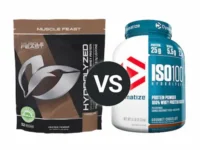Knowledge BaseYou're Questions Answered
How long does whey protein powder last?
Whey protein powder is a popular supplement used to increase dietary protein intake. Like all food products, whey protein powder has a shelf life, which can vary depending on factors such as storage conditions, packaging, and the presence of preservatives. Understanding how long whey protein powder lasts and the best practices for storing it can help ensure that the product remains safe and effective.
Shelf Life of Whey Protein Powder
1. Typical Shelf Life
The typical shelf life of unopened whey protein powder is around 1 to 2 years from the date of manufacture. This timeframe can vary depending on the specific brand, formulation, and any added ingredients. Most whey protein powders will have an expiration date or "best by" date printed on the packaging, indicating how long the product is expected to maintain its quality1.
2. Factors Affecting Shelf Life
- Packaging: Whey protein powders packaged in airtight, opaque containers are better protected from light, air, and moisture, which can degrade the product over time. Some products may also use nitrogen flushing to reduce oxygen exposure and extend shelf life.
- Preservatives: Some whey protein powders contain natural or artificial preservatives that can help prevent spoilage and extend shelf life. However, not all products include these additives.
- Storage Conditions: Proper storage is crucial for maintaining the quality of whey protein powder. It should be stored in a cool, dry place away from direct sunlight and moisture. High temperatures and humidity can accelerate the degradation of the protein powder.
Signs of Spoilage
Even if the whey protein powder is within its expiration date, it's important to check for signs of spoilage, which can include:
- Unpleasant Odor: A rancid or off smell may indicate that the powder has gone bad.
- Change in Color or Texture: Clumping, discoloration, or an unusual texture can be signs of spoilage.
- Off Taste: A bitter or unusual taste may suggest that the product is no longer fresh.
Best Practices for Storage
To maximize the shelf life of whey protein powder, follow these storage tips:
- Keep the Container Sealed: Always reseal the container tightly after each use to prevent exposure to air and moisture.
- Store in a Cool, Dry Place: A pantry or cupboard away from heat sources and direct sunlight is ideal. Avoid storing protein powder in a humid environment, such as a bathroom or near a stove.
- Use a Dry Scoop: Ensure that the scoop used for measuring the powder is dry to avoid introducing moisture into the container.
- Hoffman, J. R., & Falvo, M. J. (2004). Protein–which is best? Journal of Sports Science & Medicine, 3(3), 118-130.
- Jäger, R., Kerksick, C. M., Campbell, B. I., Cribb, P. J., Wells, S. D., Skwiat, T. M., ... & Purpura, M. (2017). International Society of Sports Nutrition Position Stand: protein and exercise. Journal of the International Society of Sports Nutrition, 14(1), 20.
- Boirie, Y., Dangin, M., Gachon, P., Vasson, M. P., Maubois, J. L., & Beaufrère, B. (1997). Slow and fast dietary proteins differently modulate postprandial protein accretion. Proceedings of the National Academy of Sciences, 94(26), 14930-14935.
Related Questions
Related Reviews

Your Answer
We are a participant in the Amazon Services LLC Associates Program, an affiliate advertising program designed to provide a means for us to earn fees by linking to Amazon.com and affiliated sites.



